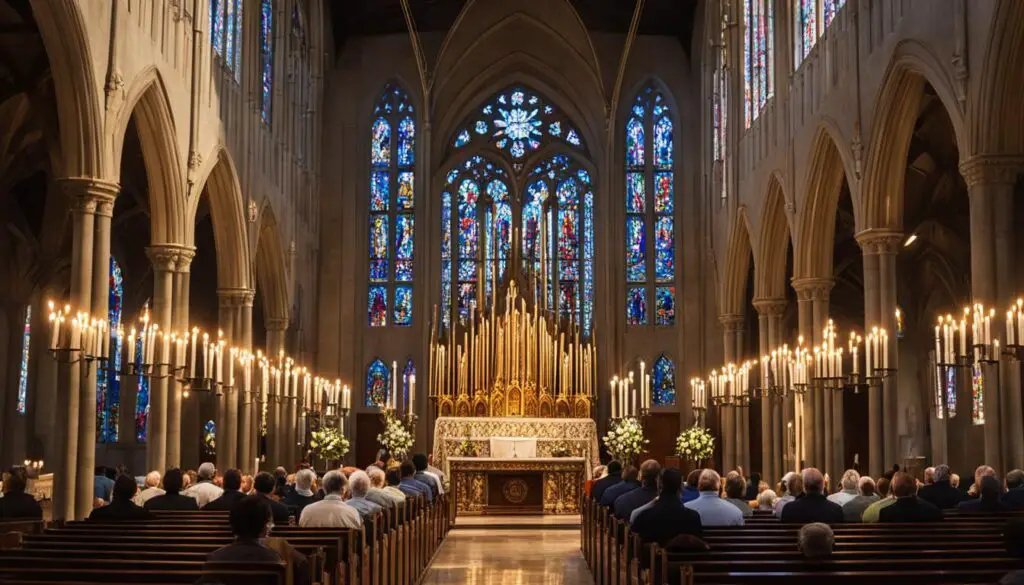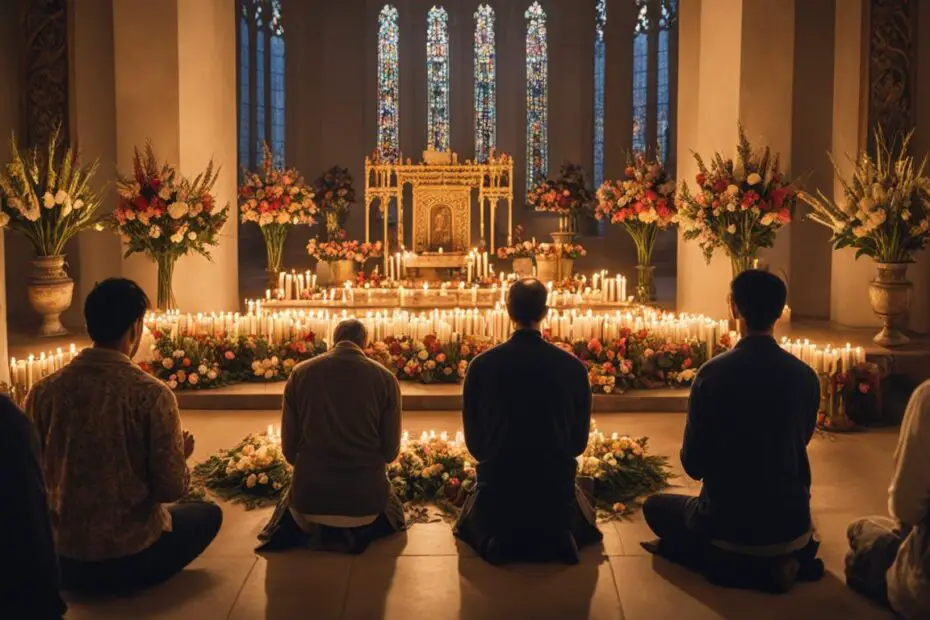Discover the profound spiritual practice of the traditional prayer of adoration, a timeless way to express devotion and reverence to God. This ancient form of worship has been cherished for generations, nurturing the faith of believers and providing solace and strength in their spiritual journey.
Key Takeaways:
- Experience the transformative power of the traditional prayer of adoration.
- Understand the significance of the Eucharist, the source of adoration.
- Explore the role of the Blessed Sacrament in adoration and worship.
- Discover prayers for reparation and conversion in the practice of adoration.
- Engage in spending dedicated time with Jesus through adoration to nurture your relationship with Him.
Understanding the Eucharist: The Source of Adoration
The Eucharist, also known as Holy Communion, lies at the heart of the traditional prayer of adoration. It is in this sacred sacrament that Catholics find the source of their adoration and connection with God. Within the Eucharist, believers encounter the Real Presence, an extraordinary belief that the bread and wine used in the sacrament are transformed into the actual Body and Blood of Jesus Christ.
This profound belief forms the cornerstone of the adoration prayer, where individuals come together to acknowledge and adore Jesus’s presence within the Eucharist. It is a practice deeply rooted in the traditional worship of the Catholic Church, providing a tangible and intimate connection to the divine. Through the adoration prayer, believers enter into communion with Jesus, expressing their reverence, love, and devotion.
There is no greater act of faith than partaking in the Eucharist and embracing the profound mystery it holds. As the central focus of adoration, the Eucharist allows individuals to experience the transformative power of traditional worship, inviting them to enter into a deep, personal relationship with Jesus, their Savior and Lord.

“The Eucharist is the source and summit of the Christian life.” – Vatican II
The Significance of the Blessed Sacrament in Adoration
The traditional prayer of adoration holds a deep reverence for the Blessed Sacrament, the consecrated host of the Eucharist. It serves as a tangible representation of Jesus’s presence, a sacred symbol that believers hold in the highest regard during adoration. Through prayers, acts of contrition, and moments of silence, individuals express their devotion to Jesus, finding solace and strength in the presence of the Blessed Sacrament.
“The Blessed Sacrament is not only a beautiful object of devotion but also a source of grace and spiritual nourishment for the soul.”
During adoration, believers center their prayers and contemplation around the Blessed Sacrament, recognizing it as a sacred vessel of God’s love and mercy. The act of adoration becomes a profound way to connect with Jesus, offering heartfelt praise and gratitude for His sacrifice and presence in the Eucharist.
Praying before the Blessed Sacrament cultivates a sense of awe and reverence, inspiring individuals to bring their joys, sorrows, and intentions before the Lord. It is a time to seek forgiveness, find guidance, and strengthen one’s relationship with God. Through this divine encounter, believers experience a deep sense of peace and unity with the Creator.
The Transformative Power of the Blessed Sacrament
The Blessed Sacrament holds transformative power in the lives of those who engage in adoration prayer. It is a powerful reminder of Jesus’s selfless love and His invitation to partake in His divine presence. By spending time in adoration, individuals open themselves to receive grace, healing, and spiritual growth.
Within the presence of the Blessed Sacrament, the faithful find solace and comfort in times of difficulty and turmoil. The sacramental encounter strengthens their faith, providing reassurance that Jesus is with them in every circumstance. Through adoration, believers develop a deeper trust in God’s plans and experience the peace that surpasses all understanding.
Moreover, the Blessed Sacrament nourishes the soul and empowers individuals to live out their faith in the world. It serves as a source of inspiration, prompting believers to seek holiness, strive for righteousness, and share the love of Jesus with others. Adoration prayer before the Blessed Sacrament transforms hearts and renews the spirit, enabling believers to become true disciples of Christ.

| Key Points | Benefits |
|---|---|
| Recognizes the sacred presence of Jesus in the Eucharist | Deepens devotion and reverence |
| Fosters spiritual growth and transformation | Brings solace and peace in times of difficulty |
| Offers grace, healing, and forgiveness | Strengthens faith and trust in God |
| Inspires a life of holiness and discipleship | Renews the spirit and empowers believers |
Prayers for Reparation and Conversion in Adoration
The traditional prayer of adoration encompasses more than just expressions of love and reverence. It also includes prayers for reparation and conversion – prayers aimed at seeking forgiveness for sins and encouraging the transformation of sinners. These prayers hold immense power in nurturing a deep connection with God and fostering a closer relationship with Him.
Reparation prayers are a profound way for believers to acknowledge their wrongdoings and seek forgiveness for any harm or offense caused to Jesus. They express humility, contrition, and a sincere desire to make amends for their actions. Through these prayers, individuals take responsibility for their mistakes and seek healing and reconciliation with God.
“O my God, I am heartily sorry for having offended Thee, and I detest all my sins because I dread the loss of Heaven and the pains of Hell, but most of all because they have offended Thee, my God, Who art all good and deserving of all my love. I firmly resolve with the help of Thy grace to confess my sins, to do penance, and to amend my life.”
Conversion prayers, on the other hand, reflect a desire to bring others closer to God. Believers offer these prayers in the hope of inspiring a change of heart and mind in those who have strayed from the path of faith. They express gratitude for God’s mercy and intercede on behalf of others, asking for the grace of conversion and the gift of faith.
“Heavenly Father, I pray for the conversion of all those who have turned away from You. Touch their hearts and lead them back to Your loving embrace. Grant them the grace to recognize Your presence in their lives and the willingness to follow Your will. Bring them into the light of Your truth and the joy of Your salvation.”
These prayers for reparation and conversion are powerful tools for believers to draw closer to God and seek spiritual transformation. They form an integral part of the traditional adoration prayer, allowing individuals to express their heartfelt desire for forgiveness, healing, and reconciliation.

| Prayers for Reparation and Conversion in Adoration | Prayer | Meaning |
|---|---|---|
| Act of Contrition | O my God, I am heartily sorry… | Expressing sincere remorse for sins committed and seeking God’s forgiveness |
| Prayer for Conversion | Heavenly Father, I pray for the conversion of all those… | Interceding for the conversion of others and asking for God’s grace |
| Chaplet of Divine Mercy | Eternal Father, I offer You the Body and Blood… | Seeking God’s mercy for oneself and the conversion of sinners |
| Seven Sorrows of Mary | O my Jesus, forgive us our sins, save us… | Reflecting on the sorrowful journey of Mary and seeking God’s mercy |
The Practice of Adoration and Spending Time With Jesus
In the practice of adoration, believers dedicate time to be in the presence of Jesus in the Eucharist. It is a sacred time of prayer, reflection, and communion with God. Through the adoration prayer, individuals have the opportunity to deepen their relationship with Jesus and experience His love and grace.
During adoration, there are various activities that believers can engage in to enhance their connection with Jesus. Reading scripture allows for a deeper understanding of His teachings and a source of guidance for personal growth. Reciting prayers, such as the Rosary or the Divine Mercy Chaplet, brings solace and strengthens faith. Additionally, sitting in contemplative silence allows for a profound encounter with Jesus, inviting His presence and listening to His voice.
Spending time with Jesus during adoration is an opportunity to pour out one’s heart before Him, expressing gratitude, love, and adoration. It is a chance to bring all joys, sorrows, and concerns to the feet of the Savior, knowing that He listens and understands. Through adoration, believers find comfort, healing, and renewed hope, as well as a deep sense of peace that surpasses all understanding.
“Adoration is the spiritual sharing in the divine beauty of God’s infinite goodness.” – St. John Paul II
Adoration offers a unique space for believers to disconnect from the distractions of the world and connect intimately with Jesus. It is a time of intimacy, where hearts open, and souls are refreshed by the presence of the Lord. In this sacred encounter, believers are transformed and renewed, finding strength, solace, and inspiration to live out their faith more fully.
The Transformative Power of Adoration
Adoration has the power to transform lives and draw believers closer to Jesus. It is a practice that invites individuals to surrender their burdens, find healing from past wounds, and receive the grace to overcome challenges. Through spending time with Jesus in the Eucharist, believers are filled with His love and encounter His mercy.
As believers practice adoration and spend time with Jesus, they experience a deepening of their relationship with Him. They come to know Him more intimately, growing in trust, and finding assurance in His unwavering presence. This encounter with the living God renews their faith, ignites their passion for holiness, and inspires them to follow Him more earnestly.

A visually appealing and relevant image depicting the practice of adoration.
| Benefits of Spending Time with Jesus in Adoration |
|---|
| Deepens spiritual connection and intimacy with Jesus |
| Provides solace, comfort, and healing |
| Brings clarity, guidance, and peace in decision-making |
| Strengthens faith and trust in God’s providence |
| Offers a sanctuary for personal reflection and self-discovery |
| Fosters a heart of gratitude and adoration for God’s goodness |
Spending time with Jesus in adoration is a powerful practice that nourishes the soul and enhances one’s spiritual journey. It is an opportunity to encounter the divine presence, surrender to His love, and be transformed by His grace. Through the practice of adoration, believers find solace, guidance, and a deepening of their faith in Jesus, the source of all life and love.
Traditional Prayers of Adoration
The traditional prayer of adoration encompasses a wide range of prayers that have been handed down through generations, providing believers with a structured way to express their adoration and devotion to God. These prayers, filled with gratitude, love, and reverence, allow individuals to deepen their connection with the divine.
Here are a few examples of traditional prayers of adoration:
- The Angel’s Prayer at Fatima: This powerful prayer, taught by the Angel of Peace to three shepherd children in Fatima, Portugal, invites believers to adore and honor the Holy Trinity. It serves as a reminder of God’s presence and power in our lives.
- The Blessed Sacrament Chaplet: This chaplet is specifically designed to honor and adore Jesus in the Blessed Sacrament. By reciting this prayer, believers express profound reverence and devotion to Jesus’s true presence in the Eucharist.
- A Short Visit to the Blessed Sacrament Before Meditation: This prayer, often performed before personal meditation or contemplation, involves spending time in the presence of the Blessed Sacrament. Through words of adoration and gratitude, individuals seek solace and inspiration from the divine.
These traditional prayers of adoration provide a spiritual framework for believers to express their love and reverence to God. Whether recited individually or as part of a community, these prayers evoke a sense of awe and devotion, strengthening one’s faith and nurturing a deeper connection with the divine.

The Power of the Eucharist in Transformation
The Eucharist holds a profound transformative power in the lives of believers. Through the traditional prayer of adoration, individuals can experience a deep connection with God, finding solace, strength, and guidance in their faith. The act of adoration allows believers to enter into a sacred space where they can encounter the true presence of Jesus in the Eucharist.
During adoration, believers are invited to reflect on the sacrifice of Jesus and honor His body and blood, which are present in the consecrated bread and wine. This act of reverence opens the door for transformative encounters with the divine. It is a time for individuals to lay their burdens at the feet of Jesus, seeking forgiveness, healing, and renewal.
Adoration is not merely a passive observance but a call to action. Through the power of the Eucharist, believers are invited to translate their adoration into tangible acts of love and service. The transformative encounter with Christ compels individuals to live out the teachings of Jesus, seeking justice, mercy, and compassion in their daily lives.
The Power of Adoration Prayer
Adoration prayer goes beyond superficial religious practices; it is an opportunity for believers to engage in deep communion with God. It is a time for stillness, reflection, and surrender. Through adoration, individuals can experience a profound sense of peace, comfort, and restoration.
“Adoration is the supreme prayer that acknowledges, believes, and adores the presence of God in our lives. It is through this prayer that we surrender ourselves to God, and in turn, find transformation and renewal.” – Saint Teresa of Avila
In the presence of the Eucharist, believers are invited to pour out their hearts in prayer, expressing their hopes, fears, and desires to God. It is a time to seek divine guidance, discernment, and strength. Adoration prayer allows individuals to deepen their relationship with God, fostering a sense of intimacy and trust.
The Transformative Power of Traditional Adoration
The transformative power of traditional adoration lies in its ability to transcend the limitations of the human experience. In the presence of the Eucharist, believers can find solace in times of hardship, strength in times of weakness, and healing in times of brokenness.
As individuals immerse themselves in the ritual of adoration, they are enveloped in the divine love of Christ. The power of the Eucharist emanates from within, touching the deepest parts of the soul and bringing about profound transformation. It is a sacred encounter that nourishes, heals, and restores the spirit.
Through traditional adoration, believers are reminded of the eternal truths of the faith and are encouraged to align their lives with the teachings of Jesus. The transformative power of the Eucharist empowers individuals to be agents of positive change in the world, spreading love, compassion, and justice.
Let us embrace the transformative power of the Eucharist in our lives. Through the practice of traditional adoration, we can experience the deep connection with God that our souls long for. May the power of the Eucharist guide us on our journey of faith, empowering us to be beacons of light in a world that yearns for God’s love and transformation.
Adoration as a Form of Worship in the Catholic Church
Adoration is an integral part of worship in the Catholic Church. It is a practice that allows believers to express their love and devotion to God, recognizing Jesus’s presence in the Eucharist. Through adoration, Catholics have the opportunity to deepen their relationship with God and find solace in their faith.
During adoration, the Blessed Sacrament, which refers to the consecrated host of the Eucharist, is displayed for individuals to come and spend time in prayer and reflection. Adoration is often held in churches or chapels, creating a sacred space where believers can gather and offer their adoration to God.
The act of adoration goes beyond mere words or rituals; it is an act of reverence and humility. It is a time to enter into the presence of God, focusing our attention solely on Him and His divine presence in the Eucharist. Through adoration, Catholics express their gratitude, seek forgiveness, offer praise, and pour out their hearts before the Lord.
Adoration allows individuals to escape the distractions of the world and surrender themselves completely to God. It is a time of deep connection, where believers can experience the transformative power of the Eucharist and find spiritual nourishment for their souls.
Adoration is a moment of divine encounter, where the faithful can bask in the presence of God and offer their hearts to Him in worship. It is a time of intimate communion, where we lay our burdens before the Lord and find strength and peace in His embrace.
During adoration, Catholics can engage in a variety of practices to deepen their worship. This may include reciting traditional prayers, meditating on scripture, or simply sitting in silent contemplation. The act of adoration allows believers to open themselves up to the grace and presence of God, inviting Him to transform their lives from the inside out.
Benefits of Adoration
Adoration offers numerous benefits for individuals seeking to strengthen their faith. Some of these benefits include:
- Gaining a deeper understanding of the love and mercy of God
- Finding solace and peace in the presence of Jesus
- Gaining clarity and guidance in times of uncertainty
- Experiencing a greater sense of gratitude and humility
- Receiving spiritual healing and renewal
- Strengthening one’s relationship with God
Through adoration, believers can cultivate a deeper sense of devotion and adoration, allowing their faith to flourish and their hearts to be transformed. It is a practice that invites individuals to embrace the awe-inspiring beauty of God’s love and to offer their lives as a living sacrifice of worship.
Adoration as a form of worship stands as a testament to the deeply-rooted traditions of the Catholic Church. It is a practice that has withstood the test of time, bringing countless individuals closer to God and nourishing their souls. Through adoration, Catholics find solace, strength, and inspiration in their faith journey, allowing them to live out their lives as a reflection of God’s love.
The Historical and Spiritual Significance of Adoration
Adoration holds a profound historical and spiritual significance within the Catholic tradition. Dating back to the early Church, this sacred practice has been embraced by saints and devout believers throughout history. It serves as a gateway for individuals to connect with the rich spiritual heritage of the Church, immersing themselves in the worship and devotion that has been handed down through generations.
Adoration prayer signifies a deep reverence and adoration for God, allowing believers to express their love and devotion through heartfelt prayers, acts of contrition, and moments of silent communion. The historical significance of adoration lies in its ability to bridge the past and present, as it carries the wisdom and devotion of countless souls who have sought solace and strength through this timeless practice.
The spiritual significance of adoration prayer lies in its transformative power. Through this sacred practice, individuals can experience a profound connection with the divine, finding solace, and drawing strength from their faith. Adoration opens the door to experiencing the presence of God in a deeply personal and intimate way.
By participating in adoration, believers can tap into the spiritual wealth of the Catholic tradition, joining a community of faithful individuals who have sought refuge and spiritual nourishment through this practice. It is a powerful reminder that they are not alone in their journey of faith and that the teachings and examples of those who came before continue to guide and inspire.
Adoration allows individuals to momentarily detach from the demands and distractions of the world, immersing themselves in a sacred space where they can cultivate a deeper connection with God. It offers respite for the soul, a sanctuary where one can find solace, strength, and guidance in the presence of Jesus in the Eucharist.
The Continuity of Tradition
Adoration prayer serves as a vital link between believers of different generations, creating continuity within the Catholic tradition. It enables individuals to partake in a practice that has shaped the faith of countless individuals over centuries. By participating in adoration, believers not only honor the legacy of those who have gone before but also contribute to the spiritual growth of future generations.
Through adoration, believers have the opportunity to embrace their spiritual heritage, finding comfort in the knowledge that they are part of a timeless and enduring tradition. It is a practice that transcends time and connects individuals with the spiritual rhythms and wisdom that have guided the faithful for centuries.
As believers engage in adoration prayer, they join in a collective act of reverence, becoming part of a spiritual tapestry that spans the ages. This sense of unity and connection fosters a deepening of faith, strengthening the individual and the community as they come together to worship, adore, and draw inspiration from the power of the Eucharist.
The Role of Adoration in Finding Solace and Strength
Adoration, a deeply spiritual practice, holds the power to provide solace and strength to believers. In moments of quiet reflection and prayer, individuals find comfort and peace in the presence of Jesus in the Eucharist. This adoration prayer offers a sacred space for believers to lay their burdens at the feet of God and draw strength from their unwavering faith.
The Eucharist, the source of adoration, becomes a sanctuary where believers can find solace. It is in the quiet moments spent in adoration that one can immerse themselves in the profound love and understanding of God’s presence. This connection brings a sense of peace and tranquility, allowing individuals to find solace amidst life’s challenges.
“In the adoration of Jesus in the Blessed Sacrament, I found the strength to face my darkest days. The stillness and serenity of those moments brought me comfort and reaffirmed my faith in God’s unwavering love.” – Maria, Devoted Believer
Moreover, adoration also serves as a wellspring of strength for believers. By surrendering their worries and fears to God, individuals find the inner strength to face life’s trials with resilience and courage. The act of adoration helps believers tap into a higher power, renewing their spirit and empowering them to navigate through difficult times.
Through adoration, believers experience the transformative power of faith. It is in these sacred moments that one can find solace, peace, and the strength needed to carry on. The practice of adoration connects individuals to the eternal love and divine presence of God, offering a sanctuary where they can replenish their souls and find the courage to face life’s challenges.
Testimonies of Finding Solace and Strength in Adoration
| Name | Experience |
|---|---|
| Sarah | During moments of adoration, I feel a profound sense of peace and clarity. It is in these moments that I find the strength to carry on, knowing that God is always with me. |
| Michael | Adoration has become a beacon of hope in my life. It is a place where I can truly find solace and draw strength from God’s loving presence. Through adoration, I have learned to trust in God’s plan for me, even in the midst of uncertainty. |
| Emily | Adoration has been a lifeline for me during difficult times. It is in those moments of quiet contemplation that I find the strength to face my fears and challenges head-on. Adoration has helped me develop a deep sense of trust and reliance on God’s grace. |
Embracing the Tradition of Adoration
Embracing the tradition of adoration allows individuals to connect with their faith on a deeper level. By participating in the traditional prayer of adoration, believers can experience the transformative power of the Eucharist and find solace in the timeless practice of worshiping God. Adoration provides a pathway to nurturing and strengthening one’s faith.
In a world that is constantly changing, embracing tradition becomes an anchor that keeps our faith rooted and steadfast. Through adoration prayer, we engage in a meaningful and profound connection with God, immersing ourselves in the sacredness of the centuries-old practice. It is an opportunity to express our adoration and reverence, allowing the power of tradition to shape and inspire our spiritual journey.
“Adoration is not just a religious ritual; it is a transformative encounter with the divine. It is a moment where time seems to stand still, and we experience the presence of God in a profound and tangible way.”
During adoration, we enter into a sacred space where we can quiet our minds, open our hearts, and allow God’s grace to envelop us. It is a time of deep reflection, where we can bring our joys, fears, and challenges before the Lord, knowing that He hears our prayers and offers us solace and guidance.
The traditional adoration is not confined to a specific format or set of prayers. It is a personal and intimate encounter with the divine that transcends boundaries and unites believers across time and space. Whether through silent contemplation, recitation of traditional prayers, or reading Scripture, adoration prayer allows us to commune with God in a way that is unique and deeply personal.
“When we embrace the tradition of adoration, we step into a stream of faith that has flowed for generations. It is through this sacred practice that we connect with the faith of our ancestors and join a global community of believers.”
| Benefits of Embracing Tradition of Adoration | Meaningful Practices in Traditional Adoration |
|---|---|
| 1. Deepens our connection with God | 1. Reciting the Rosary |
| 2. Nurtures and strengthens our faith | 2. Meditating on the Stations of the Cross |
| 3. Provides a sense of belonging to a larger faith community | 3. Reflecting on the writings of the saints |
| 4. Offers solace and comfort in times of difficulties | 4. Singing hymns of adoration |
Through embracing the tradition of adoration, we open ourselves to a rich heritage of faith that spans centuries. It is a practice that invites us to set aside the distractions of the world and immerse ourselves in the presence of God. In doing so, we find renewal, inspiration, and profound connection with the divine.
Conclusion
The traditional prayer of adoration holds immense power in the lives of believers. Through this sacred practice, individuals are able to express their deep devotion, find solace in their faith, and draw strength from their relationship with God.
By embracing the tradition of adoration, believers have the opportunity to deepen their connection with God and experience the transformative power of the Eucharist. This ancient practice allows them to nurture and strengthen their faith, finding peace and comfort in the timeless act of worshiping God.
The traditional prayer of adoration not only provides a pathway to spiritual growth, but also invites individuals to fully immerse themselves in the rich heritage of the Catholic Church. By participating in adoration, believers can join in the worship and devotion that has been practiced by saints and believers throughout history.
In the midst of the challenges and uncertainties of life, the power of adoration offers a place of refuge and strength. It is a practice that allows believers to lay their burdens at the feet of God, finding solace and drawing strength from their unwavering faith. Through adoration, individuals can experience the profound presence of Jesus in the Eucharist, shaping their lives and guiding them on their spiritual journey.
FAQ
What is the traditional prayer of adoration?
The traditional prayer of adoration is a deeply spiritual practice that allows individuals to express their devotion and reverence to God.
What is the significance of the Eucharist in adoration?
The Eucharist, also known as Holy Communion, is at the heart of the traditional prayer of adoration. It is believed to be the actual Body and Blood of Jesus Christ, and adoration prayer acknowledges and adores Jesus’s presence in the Eucharist.
What is the Blessed Sacrament in adoration?
The Blessed Sacrament refers to the consecrated host of the Eucharist and holds great significance in the traditional prayer of adoration. It is a tangible representation of Jesus’s presence, and believers express their reverence and devotion through prayers, acts of contrition, and moments of silence during adoration.
Are there specific prayers for reparation and conversion in adoration?
Yes, believers often include prayers for reparation and conversion during adoration. These prayers ask for forgiveness for sins committed against Jesus and seek the conversion of sinners. They express humility, gratitude, and a desire for a closer relationship with God.
How do individuals practice adoration and spend time with Jesus?
Adoration involves spending dedicated time with Jesus in the Eucharist. It is a time of prayer, reflection, and communion with God. During adoration, believers can engage in various activities such as reading scripture, reciting prayers, or simply sitting in contemplative silence, allowing them to deepen their relationship with Jesus.
What are some traditional prayers of adoration?
The traditional prayer of adoration encompasses a wide range of prayers, each expressing gratitude, love, and reverence to God. Examples include the Angel’s Prayer at Fatima, the Blessed Sacrament Chaplet, and a short visit to the Blessed Sacrament before meditation. These prayers provide believers with a structured way to express their adoration and devotion.
How does the Eucharist have transformative power in adoration?
The Eucharist holds transformative power in the lives of believers. Through the traditional prayer of adoration, individuals can experience a deep connection with God, finding solace, strength, and guidance in their faith. The Eucharist encourages believers to translate their devotion into action, living out the teachings of Jesus in their daily lives.
Is adoration practiced as a form of worship in the Catholic Church?
Yes, adoration is an integral part of worship in the Catholic Church. It is a practice that allows believers to express their love and devotion to God, recognizing Jesus’s presence in the Eucharist. Adoration is often held in churches or chapels, where the Blessed Sacrament is displayed for individuals to come and spend time in prayer and reflection.
What is the historical and spiritual significance of adoration?
Adoration has a rich historical and spiritual significance in the Catholic tradition. It dates back to the early Church and has been practiced by saints and believers throughout history. Adoration allows individuals to connect with the spiritual heritage of the Church, joining in the worship and devotion that has been passed down through generations.
How does adoration provide solace and strength?
Adoration provides a source of solace and strength for believers. In moments of quiet reflection and prayer, individuals can find peace and comfort in the presence of Jesus in the Eucharist. Adoration offers a space for believers to lay their burdens at the feet of God and draw strength from their faith.
How can individuals embrace the tradition of adoration?
Embracing the tradition of adoration allows individuals to connect with their faith on a deeper level. By participating in the traditional prayer of adoration, believers can experience the transformative power of the Eucharist and find solace in the timeless practice of worshiping God. Adoration provides a pathway to nurturing and strengthening one’s faith.








